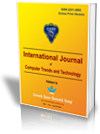Voice Recognition using MKMFCC and VQ

MLA Style:Aswathi Menon, Anjali Krishnan, Arul V H"Voice Recognition using MKMFCC and VQ" International Journal of Computer Trends and Technology 67.4 (2019): 79-84.
APA Style:Aswathi Menon, Anjali Krishnan, Arul V H (2019). Voice Recognition using MKMFCC and VQ. International Journal of Computer Trends and Technology, 67(4), 79-84.
Abstract
Voice processing is emerging as an incredible means of human communication. Increased dependency on machines by humans led to the development of voice recognition, mainly for human machine communication. It has become an inevitable part of medical, military and other security applications in recent years. Specific parameters that differentiate one speaker from another are the features, their extraction and classification describes every voice recognition system. Several voice recognition algorithms are evolved under various environmental conditions. MKMFCC (Multiple Kernel Weighted Mel Frequency Cepstral Coefficients), as a feature extraction algorithm is providing better feature extraction even in noisy or degraded environment compared to other existing algorithms. Besides, VQ (Vector Quantization), because of its low computational burden is a good classifier. This paper proposes a voice recognition system combining the good qualities of MKMFCC and VQ, with MKMFCC as the feature extraction algorithm and VQ as the classifier. The proposed system provides an accuracy of about 92.6% for the voice recognition process.
Reference
[1] H.B.Kekre, A A Athawale, Speech Recognition using Vector Quantization, International Conference and Workshop on Emerging Trends in Technology (ICWET 2011) – TCET, Mumbai, India.
[2] Madhavaraj, A., & Ramakrishnan, A. G. (2017). Design and development of a large vocabulary, continuous speech recognition system for Tamil. 2017 14th IEEE India Council International Conference (INDICON).
[3] Kumar, A. N. A., & Muthukumaraswamy, S. A. (2017). Text dependent voice recognition system using MFCC and VQ for security applications. 2017 International Conference of Electronics, Communication and Aerospace Technology (ICECA.
[4] Suman K. Saksamudre, R. R. Deshmukh, Isolated Word Recognition System for Hindi Language, International Journal of Computer Sciences and Engineering.
[5] Faragallah, O. S. (2018). Robust noise MKMFCC–SVM automatic speaker identification. International Journal of Speech Technology.
[6] Soong, F., Rosenberg, A., Rabiner, L., & Juang, B. (n.d.). A vector quantization approach to speaker recognition. ICASSP ’85. IEEE International Conference on Acoustics, Speech, and Signal Processing.
[7] Smita B Magre, Ratnadeep R. Deshmukh, Pukhraj P. Shrishrimal, A comparative study on feature extraction techniques in speech recognition, International Conference on Recent Advances in Statistics and Their Applications.
[8] K.Sarmah, Comparison Studies of Speaker Modelling Techniques in Speaker Verification System, International Journal of Scientific Research in Computer Science and Engineering Vol.5, Issue.5.
[9] Sarosi, G., Mozsary, M., Mihajlik, P., & Fegyo, T. (2011). Comparison of feature extraction methods for speech recognition in noise-free and in traffic noise environment. 2011 6th Conference on Speech Technology and Human-Computer Dialogue (SpeD).
Keywords
MKMFCC, VQ, Feature extraction, Classification


